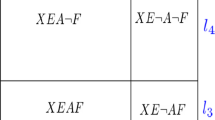Abstract
Objective Bayesianism has been criticised on the grounds that objective Bayesian updating, which on a finite outcome space appeals to the maximum entropy principle, differs from Bayesian conditionalisation. The main task of this paper is to show that this objection backfires: the difference between the two forms of updating reflects negatively on Bayesian conditionalisation rather than on objective Bayesian updating. The paper also reviews some existing criticisms and justifications of conditionalisation, arguing in particular that the diachronic Dutch book justification fails because diachronic Dutch book arguments are subject to a reductio: in certain circumstances one can Dutch book an agent however she changes her degrees of belief. One may also criticise objective Bayesianism on the grounds that its norms are not compulsory but voluntary, the result of a stance. It is argued that this second objection also misses the mark, since objective Bayesian norms are tied up in the very notion of degrees of belief.
Similar content being viewed by others
References
Bacchus F., Kyburg H.E. Jr., Thalos M. (1990) Against conditionalization. Synthese 84(3): 475–506
Bayes T. (1764) An essay towards solving a problem in the doctrine of chances. Philosophical Transactions of the Royal Society of London 53: 370–418
Bernoulli, J. (1713). Ars Conjectandi (E. D. Sylla, Trans., 2006). Baltimore: The Johns Hopkins University Press.
Dias P.M.C., Shimony A. (1981) A critique of Jaynes’ maximum entropy principle. Advances in Applied Mathematics 2(2): 172–211
Earman J. (1992) Bayes or bust?. MIT Press, Cambridge MA
Foley R. (1993) Working without a net. Oxford University Press, New York
Friedman K., Shimony A. (1971) Jaynes’s maximum entropy prescription and probability theory. Journal of Statistical Physics 3(4): 381–384
Gillies D. (2000) Philosophical theories of probability. London and New York, Routledge
Grove, A. J., & Halpern, J. Y. (1997). Probability update: Conditioning vs. cross-entropy. In Proceedings of the 13th annual conference on uncertainty in artificial intelligence (pp. 208–214). San Francisco, CA: Morgan Kaufmann.
Howson C. (1997) Bayesian rules of updating. Erkenntnis 45: 195–208
Howson C. (2000) Hume’s problem: Induction and the justification of belief. Clarendon Press, Oxford
Jaynes E.T. (2003) Probability theory: The logic of science. Cambridge University Press, Cambridge
Keynes J.M. (1921/1948). A treatise on probability. London, Macmillan
Lange M. (1999) Calibration and the epistemological role of Bayesian conditionalization. The Journal of Philosophy 96: 294–324
Ramsey, F. P. (1926). Truth and probability. In H. E. Kyburg & H. E. Smokler (Eds.), Studies in subjective probability (2nd ed., 1980, pp. 23–52). Huntington, New York: Robert E. Krieger Publishing Company.
Rosenkrantz R.D. (1977) Inference, method and decision: Towards a Bayesian philosophy of science. Reidel, Dordrecht
Rowbottom D.P. (2007) The insufficiency of the Dutch Book argument. Studia Logica 87: 65–71
Rowbottom, D. P., & Bueno, O. (2009). How to change it: modes of engagement, rationality, and stance voluntarism. Synthese. doi:10.1007/s11229-009-9521-0.
Seidenfeld T. (1979) Why I am not an objective Bayesian. Theory and Decision 11: 413–440
Seidenfeld T. (1986) Entropy and uncertainty. Philosophy of Science 53(4): 467–491
Shimony A. (1973) Comment on the interpretation of inductive probabilities. Journal of Statistical Physics 9(2): 187–191
Shimony A. (1985) The status of the principle of maximum entropy. Synthese 63: 35–53
Skyrms B. (1985) Maximum entropy inference as a special case of conditionalization. Synthese 63: 55–74
Skyrms B. (1987) Coherence. In: Rescher N. (eds) Scientific inquiry in philosophical perspective. University Press of America, Lanham, Maryland, pp 225–242
Teller P. (1973) Conditionalisation and observation. Synthese 26: 218–258
Uffink J. (1996) The constraint rule of the maximum entropy principle. Studies in History and Philosophy of Modern Physics 27: 47–79
van Fraassen B.C. (1981) A problem for relative information minimizers in probability kinematics. British Journal for the Philosophy of Science 32: 375–379
van Fraassen B.C. (1984) Belief and the will. Journal of Philosophy 81(5): 235–256
van Fraassen B.C. (1987) Symmetries of personal probability kinematics. In: Rescher N. (eds) Scientific inquiry in philosophical perspective. University Press of America, Lanham, Maryland, pp 183–223
van Fraassen B.C. (1989) Laws and symmetry. Clarendon Press, Oxford
van Fraassen B.C. (2002) The empirical stance. Yale University Press, New Haven
van Fraassen B., Hughes R., Harman G. (1986) A problem for relative information minimisers, continued. British Journal for the Philosophy of Science 37: 453–475
Williams P.M. (1980) Bayesian conditionalisation and the principle of minimum information. British Journal for the Philosophy of Science 31: 131–144
Williamson J. (2005) Bayesian nets and causality: philosophical and computational foundations. Oxford University Press, Oxford
Williamson J. (2007a) Inductive influence. British Journal for the Philosophy of Science 58(4): 689–708
Williamson J. (2007b) Motivating objective Bayesianism: From empirical constraints to objective probabilities. In: Harper W.L. (eds) Probability and inference: Essays in honour of Henry E. Kyburg Jr.. College Publications, London, pp 151–179
Williamson J. (2008a) Objective Bayesian probabilistic logic. Journal of Algorithms in Cognition, Informatics and Logic 63: 167–183
Williamson J. (2008b) Objective Bayesianism with predicate languages. Synthese 163(3): 341–356
Williamson, J. (2008c). Philosophies of probability. In A. Irvine (Ed.), Handbook of the philosophy of mathematics. Handbook of the philosophy of science (Vol. 4). Amsterdam: Elsevier.
Author information
Authors and Affiliations
Corresponding author
Rights and permissions
About this article
Cite this article
Williamson, J. Objective Bayesianism, Bayesian conditionalisation and voluntarism. Synthese 178, 67–85 (2011). https://doi.org/10.1007/s11229-009-9515-y
Received:
Accepted:
Published:
Issue Date:
DOI: https://doi.org/10.1007/s11229-009-9515-y



